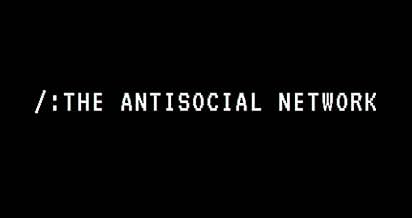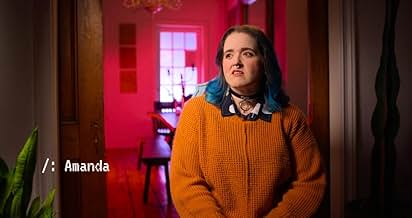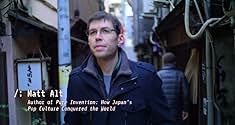Das antisoziale Netzwerk: Memes, Verschwörungstheorien und Gewalt
Originaltitel: The Antisocial Network
IMDb-BEWERTUNG
6,4/10
2695
IHRE BEWERTUNG
Eine Gruppe einsamer Teenager bildete eine Online-Gemeinschaft, um ihre Isolation zu überwinden, doch ihr kollektiver Glaube verzerrte die Realität.Eine Gruppe einsamer Teenager bildete eine Online-Gemeinschaft, um ihre Isolation zu überwinden, doch ihr kollektiver Glaube verzerrte die Realität.Eine Gruppe einsamer Teenager bildete eine Online-Gemeinschaft, um ihre Isolation zu überwinden, doch ihr kollektiver Glaube verzerrte die Realität.
- Auszeichnungen
- 1 Nominierung insgesamt
Aubrey Cottle
- Self - 4chan Founder, Anonymous Founder
- (as Kirtaner)
Isaac Green
- Self - Former QAnon YouTuber
- (as Isaac)
Stephen Bannon
- Self - Breitbart Executive Chairman
- (Archivfilmmaterial)
- (as Steve Bannon)
Jacob Chansley
- Self - January 6 Rioter
- (Archivfilmmaterial)
Stephen Colbert
- Self - Host, The Late Show with Stephen Colbert
- (Archivfilmmaterial)
Tom Cruise
- Self - Actor
- (Archivfilmmaterial)
L. Ron Hubbard
- Self - Author, Founder of Church of Scientology
- (Archivfilmmaterial)
Empfohlene Bewertungen
Directors Arthur Jones and Giorgio Angelini take us on a chilling journey in "The Antisocial Network: Memes to Mayhem," a documentary exploring the dark underbelly of online culture and its unintended consequences.
The film tackles a highly relevant issue, tracing the evolution of memes from silly jokes to tools for manipulation and the erosion of truth. Millennial interviewees, once active participants, offer a unique perspective on how their online actions spiraled out of control. The documentary masterfully weaves early internet memes with news clips and social media posts, creating a vivid timeline of events.
While focusing on the rise of 4chan, the film could delve deeper into the broader impact of other anonymous platforms. Some interviewees seem to romanticize the early days of the internet, neglecting the inherent toxicity that always existed.
Editing is sharp, seamlessly transitioning between interviews, memes, and news footage. The score is subtle yet effective, adding tension without being overly dramatic. The interviewers guide the narrative effectively, drawing insightful commentary from participants.
"The Antisocial Network" is a must-watch for anyone interested in the internet's influence on society. Despite some limitations, the film serves as a stark reminder of the responsibility we hold online and the potential for memes to morph into real-world mayhem.
The film tackles a highly relevant issue, tracing the evolution of memes from silly jokes to tools for manipulation and the erosion of truth. Millennial interviewees, once active participants, offer a unique perspective on how their online actions spiraled out of control. The documentary masterfully weaves early internet memes with news clips and social media posts, creating a vivid timeline of events.
While focusing on the rise of 4chan, the film could delve deeper into the broader impact of other anonymous platforms. Some interviewees seem to romanticize the early days of the internet, neglecting the inherent toxicity that always existed.
Editing is sharp, seamlessly transitioning between interviews, memes, and news footage. The score is subtle yet effective, adding tension without being overly dramatic. The interviewers guide the narrative effectively, drawing insightful commentary from participants.
"The Antisocial Network" is a must-watch for anyone interested in the internet's influence on society. Despite some limitations, the film serves as a stark reminder of the responsibility we hold online and the potential for memes to morph into real-world mayhem.
As one could expect, a documentary about people on the Internet gets very mixed reviews from people on the Internet.
This documentary raises many thoughts when it goes through some of the history of 4chan, Anonymous, Qanon, and MAGA, and how they link together. I found it personally very interesting, well-made, and I learned some new information. As a viewer, however, you need to remember that this is still just an edited Netflix documentary about the Internet and, well, you can never really know the whole truth about that. Do some people make themselves seem more important than they truly were? Who knows. Maybe, maybe not.
In whole, this is an important topic especially in today's world and I'm glad I decided to watch it. And you conspiracy theorists, you live in a made-up world.
This documentary raises many thoughts when it goes through some of the history of 4chan, Anonymous, Qanon, and MAGA, and how they link together. I found it personally very interesting, well-made, and I learned some new information. As a viewer, however, you need to remember that this is still just an edited Netflix documentary about the Internet and, well, you can never really know the whole truth about that. Do some people make themselves seem more important than they truly were? Who knows. Maybe, maybe not.
In whole, this is an important topic especially in today's world and I'm glad I decided to watch it. And you conspiracy theorists, you live in a made-up world.
Finally someone took the time to address this more or less properly.
So... Is it perfect? No.
But at least it tries to tackle the absurdity of the times we live in.
Going much further than other documentaries or books in unveiling some of the people that spawned the whole toxic internet trend - albeit leaving aside the vast influence of a certain current belligerent super power - it gives a simple, but credible, history lesson on why we are in the current political situation.
And no, I'm absolutely not talking just about the USA.
What happened there is ground zero for other 'experiences' that are starting to materialize in other countries (they even mention what happened in early 2000's with 2Chan) and that continue to occur in our age of misinformation.
The simple fact that some people are so desperate (and plainly stupid) as to be able to believe these pranksters should be enough to make us stop and meditate about what being online really means.
Just one more thing: this is a documentary and my rating is not based on the formal quality of the film.
This is a presentation of part of an important story.
A story that should be dissected and investigated much, much further. That said, as first efforts go this is a 5 in terms of usefulness and overall importance.
So... Is it perfect? No.
But at least it tries to tackle the absurdity of the times we live in.
Going much further than other documentaries or books in unveiling some of the people that spawned the whole toxic internet trend - albeit leaving aside the vast influence of a certain current belligerent super power - it gives a simple, but credible, history lesson on why we are in the current political situation.
And no, I'm absolutely not talking just about the USA.
What happened there is ground zero for other 'experiences' that are starting to materialize in other countries (they even mention what happened in early 2000's with 2Chan) and that continue to occur in our age of misinformation.
The simple fact that some people are so desperate (and plainly stupid) as to be able to believe these pranksters should be enough to make us stop and meditate about what being online really means.
Just one more thing: this is a documentary and my rating is not based on the formal quality of the film.
This is a presentation of part of an important story.
A story that should be dissected and investigated much, much further. That said, as first efforts go this is a 5 in terms of usefulness and overall importance.
But it managed to be educational and present its thesis quite well. The thesis is that the infamous 4chan led to such social movements as OccupyWallstreet, Anonymous, Gamergate, and the rise of Donald Trump and finally, to January 6th. It showed how these groups morphed together and separated. It shows very clearly how the alt-right latched onto meme culture and tried to hijack the political discourse. I was never on 4chan, but remember seeing their productions out in the wild. It's a cautionary tale about two things, the first about how just because you create something, that does not mean you can control it as the creator of 4chan discovered, and the second is never to underestimate the stupidity of the masses. They will beieve anything as long as its in a visual form with some white text.
The internet's influence on culture, politics and media is ubiquitous. But who influences the internet? This documentary answers that question - or starts to - by focusing on the rise of 4chan, the anonymous imageboard website that served as a surrogate online community for grassroots activists and agitators on both the left and right. This documentary exposes (perhaps unintentionally) the harrowing fact that the 4chan community was full of the most wretched, hateful and inadequate people you're ever likely to encounter. If you met any of this documentary's interviewees in person you would dismiss them as pathetic crackpots or worse and you would promptly ignore them. But ensconced in the anonymity of a signal-boosting online echo chamber they were able to exercise a grossly outsized influence on the 2010s. The internet (supposedly a means of democratizing discourse by giving a globe-spanning voice to virtually anyone) has actually given the loudest and most prominent voices to cabals of unaccountable weirdos who spend all their time on the internet.
Top-Auswahl
Melde dich zum Bewerten an und greife auf die Watchlist für personalisierte Empfehlungen zu.
Details
- Erscheinungsdatum
- Herkunftsland
- Sprache
- Auch bekannt als
- The Antisocial Network
- Weitere beteiligte Unternehmen bei IMDbPro anzeigen
- Laufzeit1 Stunde 25 Minuten
Zu dieser Seite beitragen
Bearbeitung vorschlagen oder fehlenden Inhalt hinzufügen

Oberste Lücke
What was the official certification given to Das antisoziale Netzwerk: Memes, Verschwörungstheorien und Gewalt (2024) in Australia?
Antwort



































